Deck 7: Applications of Integration
Question
Question
Question
Question
Question
Question
Question
Question
Question
Question
Question
Question
Question
Question
Question
Question
Question
Question
Question
Question
Question
Question
Question
Question
Question
Question
Question
Question
Question
Question
Question
Question
Question
Question
Question
Question
Question
Question
Question
Question
Question
Question
Question
Question
Question
Question
Question
Question
Question
Question
Question
Question
Question
Question
Question
Question
Question
Question
Question
Question
Question
Question
Question
Question
Question
Question
Question
Question
Question
Question
Question
Question
Question
Question
Question
Question
Question
Question
Question
Question

Unlock Deck
Sign up to unlock the cards in this deck!
Unlock Deck
Unlock Deck
1/119
Play
Full screen (f)
Deck 7: Applications of Integration
1
Find  for the lamina of uniform density
for the lamina of uniform density  bounded by the graphs of the equations
bounded by the graphs of the equations  and
and  .
.
A)
B)
C)
D)
E)
 for the lamina of uniform density
for the lamina of uniform density  bounded by the graphs of the equations
bounded by the graphs of the equations  and
and  .
.A)

B)

C)

D)

E)

B
2
Use the disk or the shell method to find the volume of the solid generated by revolving the region bounded by the graphs of the equations  about the x-axis.
about the x-axis.
A)
B)
C)
D)
E)
 about the x-axis.
about the x-axis. A)

B)

C)

D)

E)

A
3
Find  for the lamina of uniform density
for the lamina of uniform density  bounded by the graphs of the equations
bounded by the graphs of the equations  and
and  .
.
A)
B)
C)
D)
E)
 for the lamina of uniform density
for the lamina of uniform density  bounded by the graphs of the equations
bounded by the graphs of the equations  and
and  .
.A)

B)

C)

D)

E)

A
4
Find the fluid force of a square vertical plate submerged in water, where  meters and the weight-density of water is 9800 newtons per cubic meter.
meters and the weight-density of water is 9800 newtons per cubic meter. 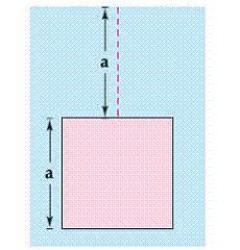
A)
B)
C)
D)
E)
 meters and the weight-density of water is 9800 newtons per cubic meter.
meters and the weight-density of water is 9800 newtons per cubic meter. 
A)

B)

C)

D)

E)


Unlock Deck
Unlock for access to all 119 flashcards in this deck.
Unlock Deck
k this deck
5
Find Mx, My, and  for the lamina of uniform density ρ bounded by the graphs of the equations
for the lamina of uniform density ρ bounded by the graphs of the equations  .
.
A)
B)
C)
D)
E)
 for the lamina of uniform density ρ bounded by the graphs of the equations
for the lamina of uniform density ρ bounded by the graphs of the equations  .
.A)

B)

C)

D)

E)


Unlock Deck
Unlock for access to all 119 flashcards in this deck.
Unlock Deck
k this deck
6
Find the volume of the solid generated by revolving the region bounded by the graphs of the equations about the  -axis. Verify your results using the integration capabilities of a graphing utility.
-axis. Verify your results using the integration capabilities of a graphing utility. 
A)
B)
C)
D)
E)
 -axis. Verify your results using the integration capabilities of a graphing utility.
-axis. Verify your results using the integration capabilities of a graphing utility. 
A)

B)

C)

D)

E)


Unlock Deck
Unlock for access to all 119 flashcards in this deck.
Unlock Deck
k this deck
7
Set up and evaluate the integral that gives the volume of the solid formed by revolving the region bounded by  and
and  about the
about the  -axis.
-axis.
A)
B)
C)
D)
E)
 and
and  about the
about the  -axis.
-axis.A)

B)

C)

D)

E)


Unlock Deck
Unlock for access to all 119 flashcards in this deck.
Unlock Deck
k this deck
8
Use the disk or the shell method to find the volume of the solid generated by revolving the region bounded by the graphs of the equations  about the line
about the line  .
.
A)
B)
C)
D)
E)
 about the line
about the line  .
.A)

B)

C)

D)

E)


Unlock Deck
Unlock for access to all 119 flashcards in this deck.
Unlock Deck
k this deck
9
Find  for the lamina of uniform density
for the lamina of uniform density  bounded by the graphs of the equations
bounded by the graphs of the equations  .
.
A)
B)
C)
D)
E)
 for the lamina of uniform density
for the lamina of uniform density  bounded by the graphs of the equations
bounded by the graphs of the equations  .
. A)

B)

C)

D)

E)


Unlock Deck
Unlock for access to all 119 flashcards in this deck.
Unlock Deck
k this deck
10
Find the center of mass of the point masses lying on the x-axis. 

A)
B)
C)
D)
E)


A)

B)

C)

D)

E)


Unlock Deck
Unlock for access to all 119 flashcards in this deck.
Unlock Deck
k this deck
11
The area of the top side of a piece of sheet metal is 10 square feet. The sheet metal is submerged horizontally in 6 feet of water. Find the fluid force on the top side. Round your answer to one decimal place.
A) 3,744.0 lb
B) 3,684.0 lb
C) 3,624.0 lb
D) 3,852.0 lb
E) 4,032.0 lb
A) 3,744.0 lb
B) 3,684.0 lb
C) 3,624.0 lb
D) 3,852.0 lb
E) 4,032.0 lb

Unlock Deck
Unlock for access to all 119 flashcards in this deck.
Unlock Deck
k this deck
12
Use the disk or shell method to find the volume of the solid generated by revolving the region bounded by the graphs of the equations about the line  .
. 
A)
B)
C)
D)
E)
 .
. 
A)

B)

C)

D)

E)


Unlock Deck
Unlock for access to all 119 flashcards in this deck.
Unlock Deck
k this deck
13
Use the shell method to set up and evaluate the integral that gives the volume of the solid generated by revolving the plane region bounded by  about the x-axis.
about the x-axis.
A)
B)
C)
D)
E)
 about the x-axis.
about the x-axis.A)

B)

C)

D)

E)


Unlock Deck
Unlock for access to all 119 flashcards in this deck.
Unlock Deck
k this deck
14
Find  ,
,  , and
, and  for the lamina of uniform density
for the lamina of uniform density  bounded by the graphs of the equations
bounded by the graphs of the equations  .
.
A)
B)
C)
D)
E)
 ,
,  , and
, and  for the lamina of uniform density
for the lamina of uniform density  bounded by the graphs of the equations
bounded by the graphs of the equations  .
. A)

B)

C)

D)

E)


Unlock Deck
Unlock for access to all 119 flashcards in this deck.
Unlock Deck
k this deck
15
Find the arc length from  clockwise to
clockwise to  along the circle
along the circle  . Round your answer to four decimal places.
. Round your answer to four decimal places.
A) 2.5232
B) 0.2804
C) 0.2432
D) 1.764
E) 2.1892
 clockwise to
clockwise to  along the circle
along the circle  . Round your answer to four decimal places.
. Round your answer to four decimal places.A) 2.5232
B) 0.2804
C) 0.2432
D) 1.764
E) 2.1892

Unlock Deck
Unlock for access to all 119 flashcards in this deck.
Unlock Deck
k this deck
16
Use the shell method to find the volume of the solid generated by revolving the plane region bounded by  , about the line
, about the line  .
.
A)
B)
C)
D)
E)
 , about the line
, about the line  .
. A)

B)

C)

D)

E)


Unlock Deck
Unlock for access to all 119 flashcards in this deck.
Unlock Deck
k this deck
17
Set up and evaluate integrals for finding the moment about the y-axis for the region bounded by the graphs of the equations. (Assume ρ =1.)  .
.
A)
B)
C)
D)
E)
 .
.A)

B)

C)

D)

E)


Unlock Deck
Unlock for access to all 119 flashcards in this deck.
Unlock Deck
k this deck
18
Find  for the lamina of uniform density
for the lamina of uniform density  bounded by the graphs of the equations
bounded by the graphs of the equations  and
and  .
.
A)
B)
C)
D)
E)
 for the lamina of uniform density
for the lamina of uniform density  bounded by the graphs of the equations
bounded by the graphs of the equations  and
and  .
. A)

B)

C)

D)

E)


Unlock Deck
Unlock for access to all 119 flashcards in this deck.
Unlock Deck
k this deck
19
A barn is 100 feet long and 40 feet wide. A cross section of the roof is the inverted catenary  . Find the number of square feet of roofing on the barn. Round your answer to the nearest integer.
. Find the number of square feet of roofing on the barn. Round your answer to the nearest integer. 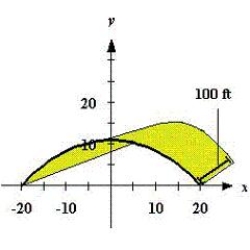
A) 4681 square feet
B) 4701 square feet
C) 2351 square feet
D) 2000 square feet
E) 4000 square feet
 . Find the number of square feet of roofing on the barn. Round your answer to the nearest integer.
. Find the number of square feet of roofing on the barn. Round your answer to the nearest integer. 
A) 4681 square feet
B) 4701 square feet
C) 2351 square feet
D) 2000 square feet
E) 4000 square feet

Unlock Deck
Unlock for access to all 119 flashcards in this deck.
Unlock Deck
k this deck
20
Find the volume of the solid generated by revolving the region bounded by the graphs of the equations  ,
,  and
and  about the line
about the line  .
.
A)

B)

C)
D)
E)

 ,
,  and
and  about the line
about the line  .
.A)


B)


C)

D)

E)



Unlock Deck
Unlock for access to all 119 flashcards in this deck.
Unlock Deck
k this deck
21
Find the area of the surface generated by revolving the curve about the y-axis.  .
.
A)
B)
C)
D)
E)
 .
.A)

B)

C)

D)

E)


Unlock Deck
Unlock for access to all 119 flashcards in this deck.
Unlock Deck
k this deck
22
Use the shell method to set up and evaluate the integral that gives the volume of the solid generated by revolving the plane region about the x-axis. 
A)
B)
C)
D)
E)

A)

B)

C)

D)

E)


Unlock Deck
Unlock for access to all 119 flashcards in this deck.
Unlock Deck
k this deck
23
A rectangular plate of height h feet and base b feet is submerged vertically in a tank of fluid that weighs w pounds per cubic foot. The center of the plate is k feet below the surface of the fluid. The fluid force on the surface of the plate is given by  . Find the fluid force on the rectangular plate as shown in the figure given
. Find the fluid force on the rectangular plate as shown in the figure given  feet and
feet and  feet and fluid is water. Round your answer to one decimal place.
feet and fluid is water. Round your answer to one decimal place. 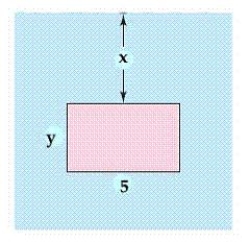
A)
B)
C)
D)
E)
 . Find the fluid force on the rectangular plate as shown in the figure given
. Find the fluid force on the rectangular plate as shown in the figure given  feet and
feet and  feet and fluid is water. Round your answer to one decimal place.
feet and fluid is water. Round your answer to one decimal place. 
A)

B)

C)

D)

E)


Unlock Deck
Unlock for access to all 119 flashcards in this deck.
Unlock Deck
k this deck
24
A solid is generated by revolving the region bounded by  and
and  about the y-axis. A hole, centered along the axis of revolution, is drilled through this solid so that one-third of the volume is removed. Find the diameter of the hole. Round your answer to three decimal places.
about the y-axis. A hole, centered along the axis of revolution, is drilled through this solid so that one-third of the volume is removed. Find the diameter of the hole. Round your answer to three decimal places.
A) 9.238
B) 4.619
C) 3.893
D) 15.07
E) 7.787
 and
and  about the y-axis. A hole, centered along the axis of revolution, is drilled through this solid so that one-third of the volume is removed. Find the diameter of the hole. Round your answer to three decimal places.
about the y-axis. A hole, centered along the axis of revolution, is drilled through this solid so that one-third of the volume is removed. Find the diameter of the hole. Round your answer to three decimal places.A) 9.238
B) 4.619
C) 3.893
D) 15.07
E) 7.787

Unlock Deck
Unlock for access to all 119 flashcards in this deck.
Unlock Deck
k this deck
25
Find the area of the region bounded by the graphs of the algebraic functions. 
A)
B)
C)
D)
E)

A)

B)

C)

D)

E)


Unlock Deck
Unlock for access to all 119 flashcards in this deck.
Unlock Deck
k this deck
26
Set up and evaluate the definite integral for the area of the surface formed by revolving the graph of  about the y-axis. Round your answer to three decimal places.
about the y-axis. Round your answer to three decimal places. 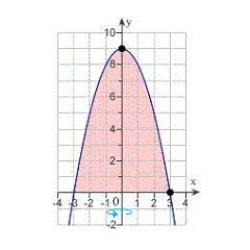
A) 58.659
B) 117.319
C) 235.685
D) 5.323
E) 2.661
 about the y-axis. Round your answer to three decimal places.
about the y-axis. Round your answer to three decimal places. 
A) 58.659
B) 117.319
C) 235.685
D) 5.323
E) 2.661

Unlock Deck
Unlock for access to all 119 flashcards in this deck.
Unlock Deck
k this deck
27
Consider a beam of length L = 5 feet with a fulcrum x feet from one end as shown in the figure. In order to move a 550-pound object, a person weighing 184 pounds wants to balance it on the beam. Find x (the distance between the person and the fulcrum) such that the system is equilibrium. Round your answer to two decimal places. 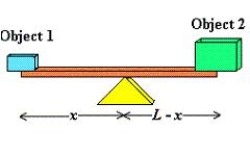
A) 5.25 feet
B) 3.50 feet
C) 3.60 feet
D) 4.75 feet
E) 3.75 feet

A) 5.25 feet
B) 3.50 feet
C) 3.60 feet
D) 4.75 feet
E) 3.75 feet

Unlock Deck
Unlock for access to all 119 flashcards in this deck.
Unlock Deck
k this deck
28
Find the arc length of the graph of the function ![<strong>Find the arc length of the graph of the function over the interval [1,2].</strong> A) B) C) D) E)](https://storage.examlex.com/TB8527/11eb71ff_b3aa_65b0_8413_457b87d41b08_TB8527_11.jpg) over the interval [1,2].
over the interval [1,2].
A)![<strong>Find the arc length of the graph of the function over the interval [1,2].</strong> A) B) C) D) E)](https://storage.examlex.com/TB8527/11eb71ff_b3aa_65b1_8413_8bc2f2cce4cf_TB8527_11.jpg)
B)![<strong>Find the arc length of the graph of the function over the interval [1,2].</strong> A) B) C) D) E)](https://storage.examlex.com/TB8527/11eb71ff_b3aa_65b2_8413_f70aac87b6f5_TB8527_11.jpg)
C)![<strong>Find the arc length of the graph of the function over the interval [1,2].</strong> A) B) C) D) E)](https://storage.examlex.com/TB8527/11eb71ff_b3aa_65b3_8413_31723210a835_TB8527_11.jpg)
D)![<strong>Find the arc length of the graph of the function over the interval [1,2].</strong> A) B) C) D) E)](https://storage.examlex.com/TB8527/11eb71ff_b3aa_65b4_8413_53ce88448a7b_TB8527_11.jpg)
E)![<strong>Find the arc length of the graph of the function over the interval [1,2].</strong> A) B) C) D) E)](https://storage.examlex.com/TB8527/11eb71ff_b3aa_8cc5_8413_3b434d062374_TB8527_11.jpg)
![<strong>Find the arc length of the graph of the function over the interval [1,2].</strong> A) B) C) D) E)](https://storage.examlex.com/TB8527/11eb71ff_b3aa_65b0_8413_457b87d41b08_TB8527_11.jpg) over the interval [1,2].
over the interval [1,2].A)
![<strong>Find the arc length of the graph of the function over the interval [1,2].</strong> A) B) C) D) E)](https://storage.examlex.com/TB8527/11eb71ff_b3aa_65b1_8413_8bc2f2cce4cf_TB8527_11.jpg)
B)
![<strong>Find the arc length of the graph of the function over the interval [1,2].</strong> A) B) C) D) E)](https://storage.examlex.com/TB8527/11eb71ff_b3aa_65b2_8413_f70aac87b6f5_TB8527_11.jpg)
C)
![<strong>Find the arc length of the graph of the function over the interval [1,2].</strong> A) B) C) D) E)](https://storage.examlex.com/TB8527/11eb71ff_b3aa_65b3_8413_31723210a835_TB8527_11.jpg)
D)
![<strong>Find the arc length of the graph of the function over the interval [1,2].</strong> A) B) C) D) E)](https://storage.examlex.com/TB8527/11eb71ff_b3aa_65b4_8413_53ce88448a7b_TB8527_11.jpg)
E)
![<strong>Find the arc length of the graph of the function over the interval [1,2].</strong> A) B) C) D) E)](https://storage.examlex.com/TB8527/11eb71ff_b3aa_8cc5_8413_3b434d062374_TB8527_11.jpg)

Unlock Deck
Unlock for access to all 119 flashcards in this deck.
Unlock Deck
k this deck
29
The figure is the vertical side of a form for poured concrete that weighs 140.7 pounds per cubic foot. Dimensions in the figure are in feet. Determine force on this part of the concrete form. 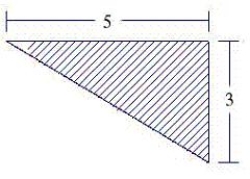
A)
B)
C)
D)
E)

A)

B)

C)

D)

E)


Unlock Deck
Unlock for access to all 119 flashcards in this deck.
Unlock Deck
k this deck
30
A circular plate of radius r feet is submerged vertically in a tank of fluid that weighs w pounds per cubic foot. The center of the circle is  feet below the surface of the fluid. The fluid force on the surface of the plate is given by
feet below the surface of the fluid. The fluid force on the surface of the plate is given by  Find the fluid force on the circular plate as shown in the figure given
Find the fluid force on the circular plate as shown in the figure given  feet and
feet and  feet and fluid is water. Round your answer to one decimal place.
feet and fluid is water. Round your answer to one decimal place. 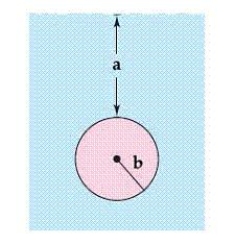
A)
B)
C)
D)
E)
 feet below the surface of the fluid. The fluid force on the surface of the plate is given by
feet below the surface of the fluid. The fluid force on the surface of the plate is given by  Find the fluid force on the circular plate as shown in the figure given
Find the fluid force on the circular plate as shown in the figure given  feet and
feet and  feet and fluid is water. Round your answer to one decimal place.
feet and fluid is water. Round your answer to one decimal place. 
A)

B)

C)

D)

E)


Unlock Deck
Unlock for access to all 119 flashcards in this deck.
Unlock Deck
k this deck
31
Use the disk or shell method to find the volume of the solid generated by revolving the region in the first quadrant bounded by the graph of the equation about the given line.  (i) the x-axis; (ii) the y-axis
(i) the x-axis; (ii) the y-axis
A)
B)
C)
D)
E)
 (i) the x-axis; (ii) the y-axis
(i) the x-axis; (ii) the y-axisA)

B)

C)

D)

E)


Unlock Deck
Unlock for access to all 119 flashcards in this deck.
Unlock Deck
k this deck
32
Find the area of the region bounded by the graphs of the algebraic functions. 

A)
B)
C)
D)
E)


A)

B)

C)

D)

E)


Unlock Deck
Unlock for access to all 119 flashcards in this deck.
Unlock Deck
k this deck
33
Find the buoyant force of a rectangular solid of the given dimensions submerged in water so that the top side is parallel to the surface of the water. The buoyant force is the difference between the fluid forces on the top and bottom sides of the solid. Round your answer to two decimal places. 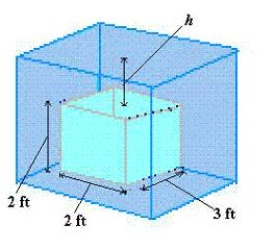
A) 249.60 lb
B) 374.40 lb
C) 748.80 lb
D) 187.20 lb
E) 124.80 lb

A) 249.60 lb
B) 374.40 lb
C) 748.80 lb
D) 187.20 lb
E) 124.80 lb

Unlock Deck
Unlock for access to all 119 flashcards in this deck.
Unlock Deck
k this deck
34
A force of 25 pounds stretches a spring 11 inches in an exercise machine. Find the work done in stretching the spring 3 feet from its natural position.
A) ft-lb
ft-lb
B) ft-lb
ft-lb
C) ft-lb
ft-lb
D) ft-lb
ft-lb
E) ft-lb
ft-lb
A)
 ft-lb
ft-lbB)
 ft-lb
ft-lbC)
 ft-lb
ft-lbD)
 ft-lb
ft-lbE)
 ft-lb
ft-lb
Unlock Deck
Unlock for access to all 119 flashcards in this deck.
Unlock Deck
k this deck
35
Find the center of mass of the given system of point masses. mi
10
5
8
4




A)
B)
C)
D)
E)
10
5
8
4





A)

B)

C)

D)

E)


Unlock Deck
Unlock for access to all 119 flashcards in this deck.
Unlock Deck
k this deck
36
A tank on the wing of a jet aircraft is formed by revolving the region bounded by the graph of  and the x-axis
and the x-axis  about the x-axis, where x and y are measured in meters. Find the volume of the tank. Round your answer to two decimal places.
about the x-axis, where x and y are measured in meters. Find the volume of the tank. Round your answer to two decimal places.
A) 0.09 m3
B) 0.03 m3
C) 0.01 m3
D) 0.17 m3
E) 0.02 m3
 and the x-axis
and the x-axis  about the x-axis, where x and y are measured in meters. Find the volume of the tank. Round your answer to two decimal places.
about the x-axis, where x and y are measured in meters. Find the volume of the tank. Round your answer to two decimal places.A) 0.09 m3
B) 0.03 m3
C) 0.01 m3
D) 0.17 m3
E) 0.02 m3

Unlock Deck
Unlock for access to all 119 flashcards in this deck.
Unlock Deck
k this deck
37
A bridge has a main span of about 1350 meters. Each of its towers has a height of about 146 meters. Approximate the length of a parabolic cable along the main span if the length C of the cable is given by  . Round your answer to one decimal place.
. Round your answer to one decimal place. 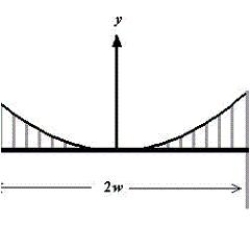
A) 695.5 meters
B) 736.4 meters
C) 2046.5 meters
D) 1391 meters
E) 2782 meters
 . Round your answer to one decimal place.
. Round your answer to one decimal place. 
A) 695.5 meters
B) 736.4 meters
C) 2046.5 meters
D) 1391 meters
E) 2782 meters

Unlock Deck
Unlock for access to all 119 flashcards in this deck.
Unlock Deck
k this deck
38
A quantity of a gas with an initial volume of 2 cubic feet and a pressure of 4500 pounds per square foot expands to a volume of 7 cubic feet. Find the work done by the gas. Round your answer to two decimal places. Assume the temperature of the gas in this process remain constant.
A) 5,637.43 ft-lb
B) 11,274.87 ft-lb
C) 3,214.29 ft-lb
D) 2,066.33 ft-lb
E) 14,484.94 ft-lb
A) 5,637.43 ft-lb
B) 11,274.87 ft-lb
C) 3,214.29 ft-lb
D) 2,066.33 ft-lb
E) 14,484.94 ft-lb

Unlock Deck
Unlock for access to all 119 flashcards in this deck.
Unlock Deck
k this deck
39
Find the area of the surface generated by revolving the curve about the x-axis.  .
.
A)
B)
C)
D)
E)
 .
.A)

B)

C)

D)

E)


Unlock Deck
Unlock for access to all 119 flashcards in this deck.
Unlock Deck
k this deck
40
Set up and evaluate the integral that gives the volume of the solid formed by revolving the region bounded by  , and
, and  about the
about the  -axis.
-axis.
A)
B)
C)
D)
E)
 , and
, and  about the
about the  -axis.
-axis.A)

B)

C)

D)

E)


Unlock Deck
Unlock for access to all 119 flashcards in this deck.
Unlock Deck
k this deck
41
Find the arc length of the graph of the function  over the interval
over the interval  .
.
A)
B)
C)
D)
E)
 over the interval
over the interval  .
.A)

B)

C)

D)

E)


Unlock Deck
Unlock for access to all 119 flashcards in this deck.
Unlock Deck
k this deck
42
Find the center of mass of the point masses lying on the x-axis. 

A)
B)
C)
D)
E)


A)

B)

C)

D)

E)


Unlock Deck
Unlock for access to all 119 flashcards in this deck.
Unlock Deck
k this deck
43
Find the fluid force of a triangular vertical plate submerged in water, where the dimensions are given in meters  and the weight-density of water is 9800 newtons per cubic meter.
and the weight-density of water is 9800 newtons per cubic meter. 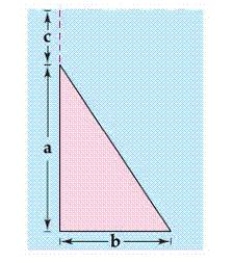
A)
B)
C)
D)
E)
 and the weight-density of water is 9800 newtons per cubic meter.
and the weight-density of water is 9800 newtons per cubic meter. 
A)

B)

C)

D)

E)


Unlock Deck
Unlock for access to all 119 flashcards in this deck.
Unlock Deck
k this deck
44
An overhead garage door has two springs, one on each side of the door. A force of 16 pounds is required to stretch each spring 1 foot. Because of the pulley system, the springs stretch only one-half the distance the door travels. The door moves a total of 16 feet and springs are at their natural length when the door is open. Find the work done by pair of strings.
A) 512 ft-lb
B) 1,024 ft-lb
C) 8,192 ft-lb
D) 4,096 ft-lb
E) 2,048 ft-lb
A) 512 ft-lb
B) 1,024 ft-lb
C) 8,192 ft-lb
D) 4,096 ft-lb
E) 2,048 ft-lb

Unlock Deck
Unlock for access to all 119 flashcards in this deck.
Unlock Deck
k this deck
45
Find the arc length of the graph of the function ![<strong>Find the arc length of the graph of the function over the interval [0,5].</strong> A) B) C) D) E)](https://storage.examlex.com/TB8527/11eb71ff_b3ad_7353_8413_6b3e39ffee74_TB8527_11.jpg) over the interval [0,5].
over the interval [0,5].
A)![<strong>Find the arc length of the graph of the function over the interval [0,5].</strong> A) B) C) D) E)](https://storage.examlex.com/TB8527/11eb71ff_b3ad_7354_8413_e5f41022d727_TB8527_11.jpg)
B)![<strong>Find the arc length of the graph of the function over the interval [0,5].</strong> A) B) C) D) E)](https://storage.examlex.com/TB8527/11eb71ff_b3ad_7355_8413_83614e13c495_TB8527_11.jpg)
C)![<strong>Find the arc length of the graph of the function over the interval [0,5].</strong> A) B) C) D) E)](https://storage.examlex.com/TB8527/11eb71ff_b3ad_7356_8413_b9b258ea62f8_TB8527_11.jpg)
D)![<strong>Find the arc length of the graph of the function over the interval [0,5].</strong> A) B) C) D) E)](https://storage.examlex.com/TB8527/11eb71ff_b3ad_7357_8413_e369ebbd4f4f_TB8527_11.jpg)
E)![<strong>Find the arc length of the graph of the function over the interval [0,5].</strong> A) B) C) D) E)](https://storage.examlex.com/TB8527/11eb71ff_b3ad_9a68_8413_afb325da324f_TB8527_11.jpg)
![<strong>Find the arc length of the graph of the function over the interval [0,5].</strong> A) B) C) D) E)](https://storage.examlex.com/TB8527/11eb71ff_b3ad_7353_8413_6b3e39ffee74_TB8527_11.jpg) over the interval [0,5].
over the interval [0,5].A)
![<strong>Find the arc length of the graph of the function over the interval [0,5].</strong> A) B) C) D) E)](https://storage.examlex.com/TB8527/11eb71ff_b3ad_7354_8413_e5f41022d727_TB8527_11.jpg)
B)
![<strong>Find the arc length of the graph of the function over the interval [0,5].</strong> A) B) C) D) E)](https://storage.examlex.com/TB8527/11eb71ff_b3ad_7355_8413_83614e13c495_TB8527_11.jpg)
C)
![<strong>Find the arc length of the graph of the function over the interval [0,5].</strong> A) B) C) D) E)](https://storage.examlex.com/TB8527/11eb71ff_b3ad_7356_8413_b9b258ea62f8_TB8527_11.jpg)
D)
![<strong>Find the arc length of the graph of the function over the interval [0,5].</strong> A) B) C) D) E)](https://storage.examlex.com/TB8527/11eb71ff_b3ad_7357_8413_e369ebbd4f4f_TB8527_11.jpg)
E)
![<strong>Find the arc length of the graph of the function over the interval [0,5].</strong> A) B) C) D) E)](https://storage.examlex.com/TB8527/11eb71ff_b3ad_9a68_8413_afb325da324f_TB8527_11.jpg)

Unlock Deck
Unlock for access to all 119 flashcards in this deck.
Unlock Deck
k this deck
46
A 22-foot chain that weighs 2 pounds per foot hangs from a winch 22 feet above ground level. Find the work done by the winch in winding up the entire chain.
A) 290.40 ft-lb
B) 871.20 ft-lb
C) 726.00 ft-lb
D) 387.20 ft-lb
E) 484.00 ft-lb
A) 290.40 ft-lb
B) 871.20 ft-lb
C) 726.00 ft-lb
D) 387.20 ft-lb
E) 484.00 ft-lb

Unlock Deck
Unlock for access to all 119 flashcards in this deck.
Unlock Deck
k this deck
47
The chief financial officer of a company reports that profits for the past fiscal year were $17.8 million. The officer predicts that profits for the next 8 years will grow at a continuous annual rate somewhere between  % and 8%. Estimate the cumulative difference in total profit over the 8 years based on the predicted range of growth rates. Round your answer to three decimal places.
% and 8%. Estimate the cumulative difference in total profit over the 8 years based on the predicted range of growth rates. Round your answer to three decimal places.
A) $614.225 billion
B) $38.411 billion
C) $35.132 billion
D) $2.134 billion
E) $133.803 billion
 % and 8%. Estimate the cumulative difference in total profit over the 8 years based on the predicted range of growth rates. Round your answer to three decimal places.
% and 8%. Estimate the cumulative difference in total profit over the 8 years based on the predicted range of growth rates. Round your answer to three decimal places.A) $614.225 billion
B) $38.411 billion
C) $35.132 billion
D) $2.134 billion
E) $133.803 billion

Unlock Deck
Unlock for access to all 119 flashcards in this deck.
Unlock Deck
k this deck
48
Electrical wires suspended between two towers form a catenary modeled by the equation  where x and y are measured in meters. The towers are 40 meters apart. Find the length of the suspended cable. Round your answer to three decimal places.
where x and y are measured in meters. The towers are 40 meters apart. Find the length of the suspended cable. Round your answer to three decimal places. 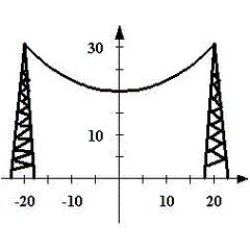
A) 61.723 m
B) 40.000 m
C) 47.008 m
D) 23.504 m
E) 30.862 m
 where x and y are measured in meters. The towers are 40 meters apart. Find the length of the suspended cable. Round your answer to three decimal places.
where x and y are measured in meters. The towers are 40 meters apart. Find the length of the suspended cable. Round your answer to three decimal places. 
A) 61.723 m
B) 40.000 m
C) 47.008 m
D) 23.504 m
E) 30.862 m

Unlock Deck
Unlock for access to all 119 flashcards in this deck.
Unlock Deck
k this deck
49
Concrete sections for the new building have the dimensions (in meters) and shape as shown in the figure (the picture is not necessarily drawn to scale). One cubic meter of concrete weighs 5280 pounds. Find the weight of the section. Round your answer to the nearest pound. 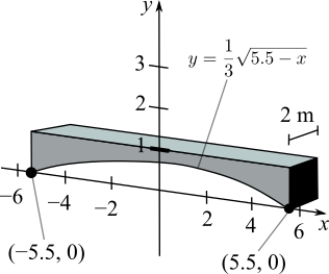
A) 93,805 pounds
B) 85,891 pounds
C) 45,062 pounds
D) 55,622 pounds
E) 71,450 pounds

A) 93,805 pounds
B) 85,891 pounds
C) 45,062 pounds
D) 55,622 pounds
E) 71,450 pounds

Unlock Deck
Unlock for access to all 119 flashcards in this deck.
Unlock Deck
k this deck
50
A quantity of gas with an initial volume of 5 cubic feet and a pressure of 1700 pounds per square foot expands to a volume of 9 cubic feet. Find the work done by the gas for the given volume and pressure. Round your answer to two decimal places. Assume the temperature of the gas in this process remain constant.
A) 2,997.71 ft-lb
B) 7,494.28 ft-lb
C) 8,993.14 ft-lb
D) 4,996.19 ft-lb
E) 3,996.95 ft-lb
A) 2,997.71 ft-lb
B) 7,494.28 ft-lb
C) 8,993.14 ft-lb
D) 4,996.19 ft-lb
E) 3,996.95 ft-lb

Unlock Deck
Unlock for access to all 119 flashcards in this deck.
Unlock Deck
k this deck
51
If the accumulation function F(x) is given by  , evaluate F(4)
, evaluate F(4)
A)
B)
C)
D)
E)
 , evaluate F(4)
, evaluate F(4)A)

B)

C)

D)

E)


Unlock Deck
Unlock for access to all 119 flashcards in this deck.
Unlock Deck
k this deck
52
A tank on a water tower is a sphere of radius 25 feet. Determine the depth of the water when the tank is filled to one-fourth of its total capacity. (Note: Use the zero or root feature of a graphing utility after evaluating the definite integral.) Round your answer to two decimal places.
A) 16.99 feet
B) 9.44 feet
C) 23.91 feet
D) 16.32 feet
E) 23.89 feet
A) 16.99 feet
B) 9.44 feet
C) 23.91 feet
D) 16.32 feet
E) 23.89 feet

Unlock Deck
Unlock for access to all 119 flashcards in this deck.
Unlock Deck
k this deck
53
A cylindrical gasoline tank 4 feet in diameter and 5 feet long is carried on the bank of a truck and is used to fuel tractors. The axis of the tank is horizontal. The opening on the tractor tank is 5 feet above the top of the tank in the truck. Find the work done in pumping the entire gasoline contents that weighs 42 pounds per cubic feet of the fuel tank into a tractor.

Unlock Deck
Unlock for access to all 119 flashcards in this deck.
Unlock Deck
k this deck
54
Find the volume of the solid generated by revolving the region bounded by the graphs of the equations about the given lines. 

A)
B)
C)
D)
E)


A)

B)

C)

D)

E)


Unlock Deck
Unlock for access to all 119 flashcards in this deck.
Unlock Deck
k this deck
55
Find the center of mass of the given system of point masses. mi
10
8
10



A)
B)
C)
D)
E)
10
8
10




A)

B)

C)

D)

E)


Unlock Deck
Unlock for access to all 119 flashcards in this deck.
Unlock Deck
k this deck
56
Find the volume of the solid generated by revolving the region bounded by the graphs of the equations about the line  .
. 
A)
B)
C)
D)
E)
 .
. 
A)

B)

C)

D)

E)


Unlock Deck
Unlock for access to all 119 flashcards in this deck.
Unlock Deck
k this deck
57
Find the volume of the solid generated by revolving the region bounded by the graphs of the equations about the  -axis.
-axis. 
A)
B)
C)
D)
E)
 -axis.
-axis. 
A)

B)

C)

D)

E)


Unlock Deck
Unlock for access to all 119 flashcards in this deck.
Unlock Deck
k this deck
58
A force of 255 Newtons stretches a spring 20 centimeters. How much work is done in stretching the spring from 10 centimeters to 40 centimeters?
A) 97.625000 joules
B) 100.625000 joules
C) 95.625000 joules
D) 90.625000 joules
E) 105.625000 joules
A) 97.625000 joules
B) 100.625000 joules
C) 95.625000 joules
D) 90.625000 joules
E) 105.625000 joules

Unlock Deck
Unlock for access to all 119 flashcards in this deck.
Unlock Deck
k this deck
59
Find the arc length of the graph of the function ![<strong>Find the arc length of the graph of the function over the interval [14, 16].</strong> A) B) C) D) E)](https://storage.examlex.com/TB8527/11eb71ff_b3ad_9a69_8413_9d11e8890e12_TB8527_11.jpg) over the interval [14, 16].
over the interval [14, 16].
A)![<strong>Find the arc length of the graph of the function over the interval [14, 16].</strong> A) B) C) D) E)](https://storage.examlex.com/TB8527/11eb71ff_b3ad_9a6a_8413_ab6f813e7696_TB8527_11.jpg)
B)![<strong>Find the arc length of the graph of the function over the interval [14, 16].</strong> A) B) C) D) E)](https://storage.examlex.com/TB8527/11eb71ff_b3ad_9a6b_8413_45dca98dbccf_TB8527_11.jpg)
C)![<strong>Find the arc length of the graph of the function over the interval [14, 16].</strong> A) B) C) D) E)](https://storage.examlex.com/TB8527/11eb71ff_b3ad_9a6c_8413_457fb6844de2_TB8527_11.jpg)
D)![<strong>Find the arc length of the graph of the function over the interval [14, 16].</strong> A) B) C) D) E)](https://storage.examlex.com/TB8527/11eb71ff_b3ad_9a6d_8413_c54cdd9608c4_TB8527_11.jpg)
E)![<strong>Find the arc length of the graph of the function over the interval [14, 16].</strong> A) B) C) D) E)](https://storage.examlex.com/TB8527/11eb71ff_b3ad_c17e_8413_ffde26ac7021_TB8527_11.jpg)
![<strong>Find the arc length of the graph of the function over the interval [14, 16].</strong> A) B) C) D) E)](https://storage.examlex.com/TB8527/11eb71ff_b3ad_9a69_8413_9d11e8890e12_TB8527_11.jpg) over the interval [14, 16].
over the interval [14, 16].A)
![<strong>Find the arc length of the graph of the function over the interval [14, 16].</strong> A) B) C) D) E)](https://storage.examlex.com/TB8527/11eb71ff_b3ad_9a6a_8413_ab6f813e7696_TB8527_11.jpg)
B)
![<strong>Find the arc length of the graph of the function over the interval [14, 16].</strong> A) B) C) D) E)](https://storage.examlex.com/TB8527/11eb71ff_b3ad_9a6b_8413_45dca98dbccf_TB8527_11.jpg)
C)
![<strong>Find the arc length of the graph of the function over the interval [14, 16].</strong> A) B) C) D) E)](https://storage.examlex.com/TB8527/11eb71ff_b3ad_9a6c_8413_457fb6844de2_TB8527_11.jpg)
D)
![<strong>Find the arc length of the graph of the function over the interval [14, 16].</strong> A) B) C) D) E)](https://storage.examlex.com/TB8527/11eb71ff_b3ad_9a6d_8413_c54cdd9608c4_TB8527_11.jpg)
E)
![<strong>Find the arc length of the graph of the function over the interval [14, 16].</strong> A) B) C) D) E)](https://storage.examlex.com/TB8527/11eb71ff_b3ad_c17e_8413_ffde26ac7021_TB8527_11.jpg)

Unlock Deck
Unlock for access to all 119 flashcards in this deck.
Unlock Deck
k this deck
60
Find the volume of the solid generated by rotating the circle  about the x-axis.
about the x-axis.
A) V = 24π
B) V = 72π2
C) V = 72π
D) V = 72π2
E) V = 24π2
 about the x-axis.
about the x-axis.A) V = 24π
B) V = 72π2
C) V = 72π
D) V = 72π2
E) V = 24π2

Unlock Deck
Unlock for access to all 119 flashcards in this deck.
Unlock Deck
k this deck
61
A tank with a base of 4 feet by 5 feet and a height of 4 feet is full of water. The water weighs 62.4 pounds per cubic foot. How much work is done in pumping water out over the top edge in order to empty all of the tank. Round your answer to one decimal place. 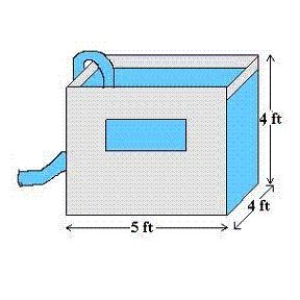
A) 1,996.8 ft-lb
B) 1,248.0 ft-lb
C) 2,496.0 ft-lb
D) 499.2 ft-lb
E) 9,984.0 ft-lb

A) 1,996.8 ft-lb
B) 1,248.0 ft-lb
C) 2,496.0 ft-lb
D) 499.2 ft-lb
E) 9,984.0 ft-lb

Unlock Deck
Unlock for access to all 119 flashcards in this deck.
Unlock Deck
k this deck
62
Use the shell method to set up and evaluate the integral that gives the volume of the solid generated by revolving the plane region about the x-axis. 
A)
B)
C)
D)
E)

A)

B)

C)

D)

E)


Unlock Deck
Unlock for access to all 119 flashcards in this deck.
Unlock Deck
k this deck
63
Find the volume of the solid generated by revolving the region bounded by the graphs of the equations about the given lines. 

A)
B)
C)
D)
E)


A)

B)

C)

D)

E)


Unlock Deck
Unlock for access to all 119 flashcards in this deck.
Unlock Deck
k this deck
64
Find the volume of the solid generated by revolving the region bounded by the graphs of the equations  , and
, and  about the
about the  -axis. Round your answer to four decimal places.
-axis. Round your answer to four decimal places.
A) 5.3098
B) 12.2824
C) 20.6444
D) 15.9387
E) 37.9232
 , and
, and  about the
about the  -axis. Round your answer to four decimal places.
-axis. Round your answer to four decimal places.A) 5.3098
B) 12.2824
C) 20.6444
D) 15.9387
E) 37.9232

Unlock Deck
Unlock for access to all 119 flashcards in this deck.
Unlock Deck
k this deck
65
Find the arc length of the graph of the function ![<strong>Find the arc length of the graph of the function over the interval [1,216].</strong> A) B) C) D) E)](https://storage.examlex.com/TB8527/11eb71ff_b3ae_36b3_8413_9394056757f1_TB8527_11.jpg) over the interval [1,216].
over the interval [1,216].
A)![<strong>Find the arc length of the graph of the function over the interval [1,216].</strong> A) B) C) D) E)](https://storage.examlex.com/TB8527/11eb71ff_b3ae_36b4_8413_93bb4c323b1e_TB8527_11.jpg)
B)![<strong>Find the arc length of the graph of the function over the interval [1,216].</strong> A) B) C) D) E)](https://storage.examlex.com/TB8527/11eb71ff_b3ae_36b5_8413_37b41bc9e15f_TB8527_11.jpg)
C)![<strong>Find the arc length of the graph of the function over the interval [1,216].</strong> A) B) C) D) E)](https://storage.examlex.com/TB8527/11eb71ff_b3ae_36b6_8413_3945aa7ca33b_TB8527_11.jpg)
D)![<strong>Find the arc length of the graph of the function over the interval [1,216].</strong> A) B) C) D) E)](https://storage.examlex.com/TB8527/11eb71ff_b3ae_36b7_8413_f9e167120cc6_TB8527_11.jpg)
E)![<strong>Find the arc length of the graph of the function over the interval [1,216].</strong> A) B) C) D) E)](https://storage.examlex.com/TB8527/11eb71ff_b3ae_36b8_8413_178f9ff327d9_TB8527_11.jpg)
![<strong>Find the arc length of the graph of the function over the interval [1,216].</strong> A) B) C) D) E)](https://storage.examlex.com/TB8527/11eb71ff_b3ae_36b3_8413_9394056757f1_TB8527_11.jpg) over the interval [1,216].
over the interval [1,216].A)
![<strong>Find the arc length of the graph of the function over the interval [1,216].</strong> A) B) C) D) E)](https://storage.examlex.com/TB8527/11eb71ff_b3ae_36b4_8413_93bb4c323b1e_TB8527_11.jpg)
B)
![<strong>Find the arc length of the graph of the function over the interval [1,216].</strong> A) B) C) D) E)](https://storage.examlex.com/TB8527/11eb71ff_b3ae_36b5_8413_37b41bc9e15f_TB8527_11.jpg)
C)
![<strong>Find the arc length of the graph of the function over the interval [1,216].</strong> A) B) C) D) E)](https://storage.examlex.com/TB8527/11eb71ff_b3ae_36b6_8413_3945aa7ca33b_TB8527_11.jpg)
D)
![<strong>Find the arc length of the graph of the function over the interval [1,216].</strong> A) B) C) D) E)](https://storage.examlex.com/TB8527/11eb71ff_b3ae_36b7_8413_f9e167120cc6_TB8527_11.jpg)
E)
![<strong>Find the arc length of the graph of the function over the interval [1,216].</strong> A) B) C) D) E)](https://storage.examlex.com/TB8527/11eb71ff_b3ae_36b8_8413_178f9ff327d9_TB8527_11.jpg)

Unlock Deck
Unlock for access to all 119 flashcards in this deck.
Unlock Deck
k this deck
66
Find the area of the region bounded by the graphs of the equations.  .
.
A)
B)
C)
D)
E)
 .
.A)

B)

C)

D)

E)


Unlock Deck
Unlock for access to all 119 flashcards in this deck.
Unlock Deck
k this deck
67
Neglecting air resistance and the weight of the propellant, determine the work done in propelling a 10-ton satellite to a height of 200 miles above Earth. Assume that the Earth has a radius of 4000 miles.
A) 2,857.14 mi-ton
B) 1,904.76 mi-ton
C) 1,142.86 mi-ton
D) 1,523.81 mi-ton
E) 4,190.48 mi-ton
A) 2,857.14 mi-ton
B) 1,904.76 mi-ton
C) 1,142.86 mi-ton
D) 1,523.81 mi-ton
E) 4,190.48 mi-ton

Unlock Deck
Unlock for access to all 119 flashcards in this deck.
Unlock Deck
k this deck
68
The figure is the vertical side of a form for poured concrete that weighs 140.7 pounds per cubic foot. Dimensions in the figure are in feet. Determine force on this part of the concrete form 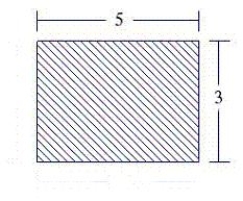
A)
B)
C)
D)
E)

A)

B)

C)

D)

E)


Unlock Deck
Unlock for access to all 119 flashcards in this deck.
Unlock Deck
k this deck
69
Use the integration capabilities of a graphing utility to approximate the arc length of the graph of  on the interval
on the interval  . Round your answer to three decimal places.
. Round your answer to three decimal places.
A) 7.440
B) 8.840
C) 5.270
D) 7.640
E) 3.820
 on the interval
on the interval  . Round your answer to three decimal places.
. Round your answer to three decimal places.A) 7.440
B) 8.840
C) 5.270
D) 7.640
E) 3.820

Unlock Deck
Unlock for access to all 119 flashcards in this deck.
Unlock Deck
k this deck
70
Concrete sections for the new building have the dimensions (in meters) and shape as shown in the figure (the picture is not necessarily drawn to scale). Find the area of the face of the section superimposed on the rectangular coordinate system. Round your answer to three decimal places. 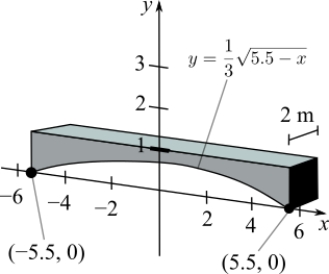
A) 6.198 m2
B) 8.883 m2
C) 6.766 m2
D) 8.134 m2
E) 5.267 m2

A) 6.198 m2
B) 8.883 m2
C) 6.766 m2
D) 8.134 m2
E) 5.267 m2

Unlock Deck
Unlock for access to all 119 flashcards in this deck.
Unlock Deck
k this deck
71
Suppose that  and
and  model the revenue (in billions of dollars) for a large corporation. The model R1 gives projected annual revenues from 2008 through 2015, with t = 8 corresponding to 2008, and R2 gives projected revenues if there is a decrease in the rate of growth of corporate sales over the period. Approximate the total reduction in revenue if corporate sales are actually closer to the model R2. Round your answer to three decimal places.
model the revenue (in billions of dollars) for a large corporation. The model R1 gives projected annual revenues from 2008 through 2015, with t = 8 corresponding to 2008, and R2 gives projected revenues if there is a decrease in the rate of growth of corporate sales over the period. Approximate the total reduction in revenue if corporate sales are actually closer to the model R2. Round your answer to three decimal places.
A) $1.540 billion
B) $10.780 billion
C) $157.780 billion
D) $24.010 billion
E) $17.710 billion
 and
and  model the revenue (in billions of dollars) for a large corporation. The model R1 gives projected annual revenues from 2008 through 2015, with t = 8 corresponding to 2008, and R2 gives projected revenues if there is a decrease in the rate of growth of corporate sales over the period. Approximate the total reduction in revenue if corporate sales are actually closer to the model R2. Round your answer to three decimal places.
model the revenue (in billions of dollars) for a large corporation. The model R1 gives projected annual revenues from 2008 through 2015, with t = 8 corresponding to 2008, and R2 gives projected revenues if there is a decrease in the rate of growth of corporate sales over the period. Approximate the total reduction in revenue if corporate sales are actually closer to the model R2. Round your answer to three decimal places.A) $1.540 billion
B) $10.780 billion
C) $157.780 billion
D) $24.010 billion
E) $17.710 billion

Unlock Deck
Unlock for access to all 119 flashcards in this deck.
Unlock Deck
k this deck
72
Find the fluid force on the vertical side of the tank, where the dimensions are given in feet. Assume that the tank is full of water. Note: The density of water is 62.4 lbs per cubic foot. 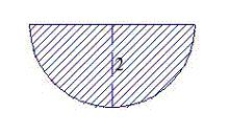
A)
B)
C)
D)
E)

A)

B)

C)

D)

E)


Unlock Deck
Unlock for access to all 119 flashcards in this deck.
Unlock Deck
k this deck
73
A lunar module weighs 16 tons on the surface of Earth. How much work is done in propelling the module from the surface of the moon to a height of 70 miles? Consider the radius of the moon to be 1100 miles and its force of gravity to be one-sixth that of Earth.
A) ft-lb
ft-lb
B) ft-lb
ft-lb
C) ft-lb
ft-lb
D) ft-lb
ft-lb
E) ft-lb
ft-lb
A)
 ft-lb
ft-lbB)
 ft-lb
ft-lbC)
 ft-lb
ft-lbD)
 ft-lb
ft-lbE)
 ft-lb
ft-lb
Unlock Deck
Unlock for access to all 119 flashcards in this deck.
Unlock Deck
k this deck
74
An open tank has the shape of a right circular cone. The tank is 12 feet across the top and 7 feet high. How much work is done in emptying the tank by pumping the water over the top edge? Note: The density of water is 62.4 lbs per cubic foot.
A) 9,172.80 ft-lb
ft-lb
B) 5,503.68 ft-lb
ft-lb
C) 7,338.24 ft-lb
ft-lb
D) 13,759.20 ft-lb
ft-lb
E) 16,511.04 ft-lb
ft-lb
A) 9,172.80
 ft-lb
ft-lbB) 5,503.68
 ft-lb
ft-lbC) 7,338.24
 ft-lb
ft-lbD) 13,759.20
 ft-lb
ft-lbE) 16,511.04
 ft-lb
ft-lb
Unlock Deck
Unlock for access to all 119 flashcards in this deck.
Unlock Deck
k this deck
75
Use the shell method to set up and evaluate the integral that gives the volume of the solid generated by revolving the plane region about the x-axis. 
A)
B)
C)
D)
E)

A)

B)

C)

D)

E)


Unlock Deck
Unlock for access to all 119 flashcards in this deck.
Unlock Deck
k this deck
76
Use the shell method to set up and evaluate the integral that gives the volume of the solid generated by revolving the plane region bounded by  about the y-axis. Round your answer to three decimal places.
about the y-axis. Round your answer to three decimal places.
A) 6.529
B) 0.533
C) 2.42
D) 0.923
E) 2.769
 about the y-axis. Round your answer to three decimal places.
about the y-axis. Round your answer to three decimal places.A) 6.529
B) 0.533
C) 2.42
D) 0.923
E) 2.769

Unlock Deck
Unlock for access to all 119 flashcards in this deck.
Unlock Deck
k this deck
77
Find the fluid force on the vertical side of the tank, where the dimensions are given in feet. Assume that the tank is full of water. Note: The density of water is 62.4 lbs per cubic foot. 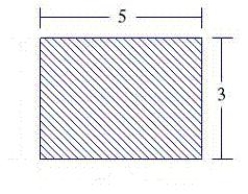
A)
B)
C)
D)
E)

A)

B)

C)

D)

E)


Unlock Deck
Unlock for access to all 119 flashcards in this deck.
Unlock Deck
k this deck
78
The surface of a machine part is the region between the graphs of  and
and  as shown in the figure. Find the area of the surface of the machine part. Round your answer to five decimal places.
as shown in the figure. Find the area of the surface of the machine part. Round your answer to five decimal places. 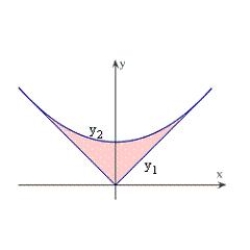
A) 4.16667
B) 2.08333
C) 0.00213
D) 104.16667
E) 52.08333
 and
and  as shown in the figure. Find the area of the surface of the machine part. Round your answer to five decimal places.
as shown in the figure. Find the area of the surface of the machine part. Round your answer to five decimal places. 
A) 4.16667
B) 2.08333
C) 0.00213
D) 104.16667
E) 52.08333

Unlock Deck
Unlock for access to all 119 flashcards in this deck.
Unlock Deck
k this deck
79
Find the area of the region bounded by the graphs of the algebraic functions. 

A)
B)
C)
D)
E)


A)

B)

C)

D)

E)


Unlock Deck
Unlock for access to all 119 flashcards in this deck.
Unlock Deck
k this deck
80
A porthole on a vertical side of a submarine (submerged in seawater) is  square
square  . Find the fluid force on the porthole, assuming that the center of the square is
. Find the fluid force on the porthole, assuming that the center of the square is  feet below the surface.
feet below the surface.
A)
B)
C)
D)
E)
 square
square  . Find the fluid force on the porthole, assuming that the center of the square is
. Find the fluid force on the porthole, assuming that the center of the square is  feet below the surface.
feet below the surface.A)

B)

C)

D)

E)


Unlock Deck
Unlock for access to all 119 flashcards in this deck.
Unlock Deck
k this deck


